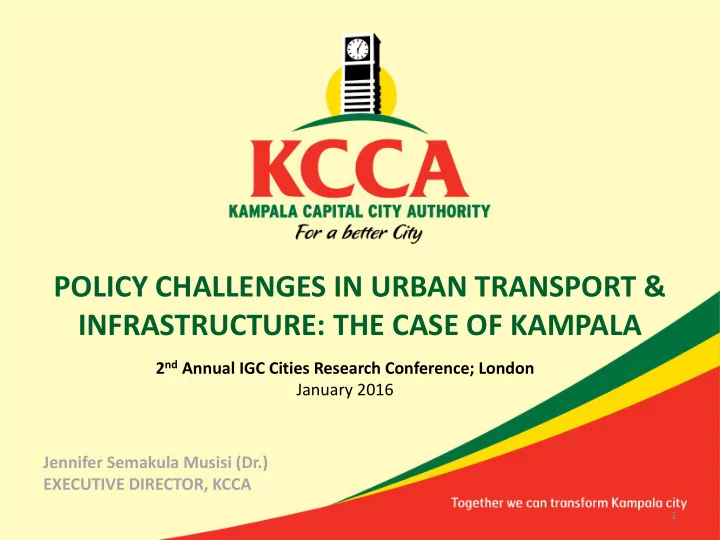

POLICY CHALLENGES IN URBAN TRANSPORT & INFRASTRUCTURE: THE CASE OF KAMPALA 2 nd Annual IGC Cities Research Conference; London January 2016 Jennifer Semakula Musisi (Dr.) EXECUTIVE DIRECTOR, KCCA 1
Profile of Kampala City: Resident popn is est. The city’s at 1.5 million while contribution to day population est. Uganda’s GDP. at 4 million . Projected population The current urban by 2040 (source: population growth KPDP). rate Area Size : 189sq Kms 2
Traffic Scenes in Kampala City: 3
Kampala Transport Network in Context Improved economic performance, greater human and social development and enhanced services are difficult to achieve with the current road network and transportation structures in Kampala. The city’s transport system is central to its economy and its people Kampala has approximately Total road network Kms 2,110 Paved 575 27% Unpaved (gravel) 1,535 73% • constructed for less than 100,000 vehicles in the 1960s and yet today with over 400,000 vehicles • Most of the roads have outlived their usefulness and need total reconstruction and expansion. 4
Congestion in the city centre Traffic Congestion has direct economic and social costs which in turn impose heavy costs on the National economy. These sometimes hidden costs, damage the competitiveness of our Cities in the regional market, the attractiveness of the city as both a tourist destination and a place to live; such costs are: • Reduced productive time - Unpredictable journey times • Increased risk and costs to motorists/pedestrians • Green House Gas emissions (GHGE) polluting the air; • Stress/anger /Tiredness as a result of road rage (Violence exhibited by drivers in traffic jam). ‘‘In Kampala, each day 24,000 man hours are lost by commuters due to traffic jam.’’ 5
Motorized Modal Split Estimation The large numbers of people traveling to the City on a daily basis, combined with the absence of a well- organized public transport system and the poor Roads, lead to problems of congestion. 6
Current Infrastructure Financing in Kampala 7
Policy and Other Challenges to Transport Infrastructure Development • Land tenure system in Uganda leading to High Resettlement costs • Under funding (Kampala requires over USD 1.5Bn to pave the entire road network) • Absence of enabling Policy framework for infrastructure financing at City Level • Failure to implement the Physical Development Plan together with the Detailed Neighborhood Plans to guide infrastructure development • Lack of a Mass Public transit system • Old and aching road infrastructure 8
Kampala – Jinja Road reconstructed 9
On-Going Interventions by KCCA • Over 150 kms of road constructed • Upgrading & Expansion of major Junctions across the urban districts - Re-construction of pedestrian • walkways Dualing of several roads • Introducing solar street lights • Developing a city wide multi- • modal transport master plan & a detailed neighborhood plan 10
Proposed Interventions by KCCA Kampala Flyover Project • Resumption of passenger rail services • Boda Boda Free Zones • Regulating heavy vehicle CBD access Non-Motorised Transport Cable cars • Bus Rapid Transit system • Congestion Fees • Multi- storey car park 11
Arising Research Questions 1. Innovative Financing for Urban infrastructure 2. Innovative Technologies for Urban Infrastructure Development 3. Analysis of the potential effect of congestion charges on economic activity in Kampala 12
Tel. +256-204-660-000
Recommend
More recommend